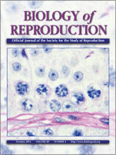
BIOLOGY OF REPRODUCTION
Scope & Guideline
Driving Discoveries in Reproductive Medicine
Introduction
Aims and Scopes
- Reproductive Physiology:
Investigations into hormonal control, signaling pathways, and physiological processes that govern reproduction, including studies on the ovarian cycle, spermatogenesis, and embryonic development. - Developmental Biology:
Research exploring the stages of development from gametogenesis to implantation and beyond, including the molecular and cellular dynamics involved in these processes. - Environmental Impact on Reproduction:
Studies assessing how environmental factors, such as endocrine disruptors and toxins, affect reproductive health and outcomes across species. - Genetics and Epigenetics in Reproduction:
Research focusing on genetic regulation, epigenetic modifications, and their implications for fertility, reproductive success, and developmental outcomes. - Stem Cells and Regenerative Medicine:
Exploration of stem cell technologies and their applications in reproductive biology, including in vitro gametogenesis and tissue engineering. - Comparative Reproductive Biology:
Comparative studies across species to identify unique reproductive strategies and mechanisms, providing insights into evolution and conservation.
Trending and Emerging
- Omics Technologies in Reproduction:
The application of genomics, transcriptomics, proteomics, and metabolomics to understand reproductive processes at a molecular level is on the rise, allowing for more detailed insights into fertility and developmental outcomes. - Microbiome and Reproductive Health:
Growing interest in the role of the microbiome in reproductive health, including its impact on fertility, pregnancy outcomes, and placental function, is becoming a prominent theme in recent publications. - Immune Factors in Reproduction:
Research exploring the interplay between the immune system and reproductive processes, including how immune responses affect implantation and pregnancy maintenance, is gaining traction. - Environmental Epigenetics:
Investigations into how environmental exposures can lead to epigenetic changes affecting reproductive health and outcomes are increasingly important, reflecting growing awareness of environmental impacts on biology. - Innovations in Assisted Reproductive Technologies (ART):
Emerging studies on novel ART methods, including advancements in cryopreservation, gamete selection, and embryo culture techniques, are becoming more prevalent as the field seeks to enhance reproductive success.
Declining or Waning
- Traditional Animal Models:
While animal models have been a staple in reproductive research, there has been a noticeable shift towards more innovative models and techniques, such as organoids and in vitro systems, resulting in decreased focus on traditional models. - Basic Fertility Assessments:
Research focusing solely on routine fertility assessments without integrating advanced technologies or molecular insights is becoming less common, as the field moves towards more comprehensive and mechanistic studies. - Single-Species Focus:
Studies that concentrate exclusively on single species without comparative or translational implications are waning, as interdisciplinary approaches that encompass multiple species are gaining prominence. - Historical Reproductive Pathologies:
There is a decline in studies that solely focus on historical or anecdotal reproductive pathologies without robust experimental backing, as the field increasingly emphasizes evidence-based approaches.
Similar Journals
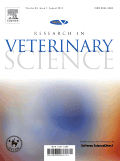
RESEARCH IN VETERINARY SCIENCE
Transforming Animal Care Through Groundbreaking StudiesRESEARCH IN VETERINARY SCIENCE, published by Elsevier Science Ltd, stands as an authoritative platform in the field of veterinary studies. With its origins dating back to 1965, this prestigious journal is recognized for its contribution to the advancement of veterinary knowledge and practices, boasting a remarkable Q1 categorization in Veterinary (miscellaneous) and ranking 24th out of 194 in the Scopus veterinary general category, placing it in the top 13% of its field. The journal presents a diverse range of research articles that explore critical topics in veterinary science, thereby facilitating evidence-based practices and innovations. Although currently not an open-access journal, it remains highly accessible through institutional and personal subscriptions, allowing researchers, professionals, and students to benefit from its rich collection of studies. As it moves toward 2024, RESEARCH IN VETERINARY SCIENCE continues to be a vital resource for those dedicated to improving animal health and advancing veterinary science.
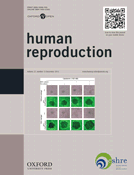
HUMAN REPRODUCTION
Shaping the future of reproductive health through rigorous scholarship.HUMAN REPRODUCTION is a prestigious academic journal published by Oxford University Press, dedicated to advancing the field of reproductive medicine. With an impressive impact factor highlighting its significance, the journal ranks in the top quartile (Q1) for Obstetrics and Gynecology, Rehabilitation, and Reproductive Medicine, showcasing its crucial role in disseminating high-quality research. Founded in 1986, it has become a key resource for researchers, practitioners, and students interested in cutting-edge developments and innovative practices in human reproduction. Despite not currently offering open access, the journal continues to publish a wealth of peer-reviewed articles that contribute substantially to clinical knowledge and practice. With Scopus rankings placing it among the top journals in its categories, HUMAN REPRODUCTION remains an essential platform for discussion and dissemination of vital findings impacting reproductive health globally.

THERIOGENOLOGY
Exploring the frontiers of reproductive physiology and biotechnology.THERIOGENOLOGY is a prestigious academic journal published by Elsevier Science Inc, dedicated to the field of veterinary reproduction and animal science. With an impressive impact factor and recognized as a Q1 journal in various categories including Animal Science and Zoology, Equine, Food Animals, and Small Animals, THERIOGENOLOGY has established itself as a vital resource for researchers, practitioners, and students alike. Founded in 1974, the journal covers a broad spectrum of topics related to reproductive physiology, biotechnology, and the health management of food and companion animals. Although it does not currently offer open access, researchers can benefit from its comprehensive articles and reviews that push the boundaries of knowledge in veterinary science. With a significant placement in the Scopus rankings, ranking #1 in multiple veterinary categories, THERIOGENOLOGY serves as an essential platform for advancing the understanding of reproductive strategies and practices, thereby contributing directly to the fields of animal husbandry and veterinary medicine.

Plant Reproduction
Bridging Gaps in Plant Reproductive ResearchPlant Reproduction is an esteemed academic journal published by Springer, dedicated to advancing the understanding of reproductive processes in plants. With its ISSN 2194-7953 and E-ISSN 2194-7961, this journal serves as a vital resource for researchers and professionals in the fields of cell biology and plant science. Since its inception in 2013, it has been recognized in the Q1 Quartile for plant science, underscoring its significance and impact within the academic community, while maintaining a ranking of #79/516 in the Scopus database for agricultural and biological sciences. The journal embraces an Open Access model, enhancing accessibility for a broader audience of scholars and practitioners. As we continue to converge our research efforts towards 2024 and beyond, Plant Reproduction remains committed to exploring innovative findings and fostering collaboration in plant reproductive biology, thereby contributing significantly to the global understanding of plant systems and their ecological impacts.

Reproductive Biology
Exploring the Mechanisms of Life's ContinuityReproductive Biology is a premier academic journal published by Elsevier, dedicated to advancing the field of reproductive science. With an ISSN of 1642-431X and an E-ISSN of 2300-732X, this journal has been serving the scientific community since its inception in 2001. It notably holds a Q1 ranking in Animal Science and Zoology as of 2023, underscoring its significant impact and prominence in this domain. The journal encompasses a wide array of topics surrounding reproductive biology, including but not limited to endocrinology and developmental processes, making it an essential resource for researchers and practitioners. Although it operates under a traditional access model, its comprehensive scope offers valuable insights that contribute to advancements in reproductive health, animal conservation, and biotechnology. Published in the Netherlands, Reproductive Biology aims to foster interdisciplinary collaboration and innovation, ultimately enriching our understanding of reproductive mechanisms across various species. Researchers, professionals, and students alike will find this journal an indispensable platform for disseminating groundbreaking research and engaging with the latest findings in reproductive science.
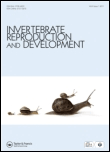
INVERTEBRATE REPRODUCTION & DEVELOPMENT
Unraveling the Mysteries of Invertebrate Biology.INVERTEBRATE REPRODUCTION & DEVELOPMENT, published by Taylor & Francis Ltd, is a pivotal journal in the fields of Animal Science and Zoology, with a significant focus on the reproductive and developmental processes of invertebrates. Established in 1989 and running through 2024, this journal has become an essential resource for researchers, professionals, and students interested in the intricacies of invertebrate biology. With an impressive Q2 ranking in Animal Science and Zoology and a dedicated readership, the journal explores a variety of topics including reproductive mechanisms, developmental stages, and phylogenetic aspects of invertebrates. While currently not open access, the journal provides robust scholarly content that contributes to advancing knowledge in both basic and applied biological sciences. The Scopus rankings further underscore its relevance, particularly in the domains of developmental biology and genetics, making it a noteworthy publication for those engaged in this dynamic field of research.

Human Reproduction Open
Connecting researchers for impactful reproductive health solutions.Human Reproduction Open, published by Oxford University Press, is a prestigious open-access journal dedicated to advancing the field of reproductive health and medicine since its inception in 2017. With an E-ISSN of 2399-3529, the journal provides a vital platform for researchers, clinicians, and academics to disseminate innovative findings in obstetrics, gynecology, and reproductive medicine. It is recognized for its impactful contributions, holding an impressive rank of #3 out of 209 in Medicine - Obstetrics and Gynecology, #2 out of 90 in Medicine - Reproductive Medicine, and #1 out of 21 in Medicine - Embryology, placing it in the top percentiles of its respective categories. The open-access model ensures that research is freely accessible, fostering collaboration and knowledge sharing among professionals and students alike. With a commitment to high-quality, peer-reviewed publications, Human Reproduction Open plays a crucial role in shaping the future of reproductive health research and practice, serving as an essential resource for those dedicated to improving outcomes in this dynamic field.

Reproductive Medicine
Exploring the Frontiers of Reproductive MedicineReproductive Medicine is an esteemed open-access journal published by MDPI, focusing on the latest research and advances in reproductive health, fertility, and assisted reproductive technologies. With its E-ISSN of 2673-3897, the journal aims to provide a platform for researchers, clinicians, and healthcare professionals to disseminate their findings, share innovative practices, and engage in scholarly discourse. Situated in Basel, Switzerland, Reproductive Medicine emphasizes a multidisciplinary approach, exploring biological, clinical, and psychological aspects of reproductive health. Although the journal is in the early stages of establishing metrics such as H-index and Scopus rankings, its open-access model enhances accessibility, allowing for a broad dissemination of knowledge. Committed to fostering advancements in the field, Reproductive Medicine is essential for those seeking to stay at the forefront of reproductive health research.
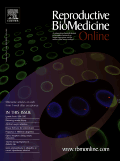
REPRODUCTIVE BIOMEDICINE ONLINE
Exploring the frontiers of reproductive biology and medicine.Reproductive Biomedicine Online, published by Elsevier, is a leading peer-reviewed journal that has established itself as a pivotal resource in the fields of Developmental Biology, Obstetrics and Gynecology, and Reproductive Medicine. With an impressive Impact Factor and a Q1 ranking in its respective disciplines as of 2023, this journal provides a platform for innovative research and comprehensive reviews that contribute to advancements in reproductive healthcare. The journal boasts rigorous Scopus rankings, placing it within the top tiers of its categories, which underscores its significance in shaping contemporary biomedical inquiry. Although not open access, it remains widely accessible through institutional subscriptions, making its wealth of knowledge available to researchers, clinicians, and students alike. Since its inception in 2000, Reproductive Biomedicine Online has been committed to fostering a deeper understanding of reproductive processes and biomedicine, ensuring that its content remains relevant and impactful in addressing challenges in reproductive health, thereby championing exceptional scientific discourse.
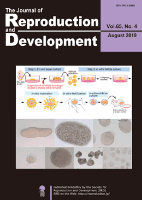
JOURNAL OF REPRODUCTION AND DEVELOPMENT
Championing biodiversity through reproductive research.JOURNAL OF REPRODUCTION AND DEVELOPMENT, published by the SOCIETY REPRODUCTION & DEVELOPMENT-SRD in Japan, is a leading peer-reviewed journal dedicated to advancing the field of reproduction and development in animal sciences. With a notable impact factor reflected in its prestigious Q1 Quartile ranking in Animal Science and Zoology, the journal aims to disseminate cutting-edge research that explores the complexities of reproductive biology, developmental processes, and their implications for agriculture and biodiversity. This journal invites contributions that span multidisciplinary interests, thereby facilitating the integration of scientific knowledge and practical applications. Researchers, professionals, and students can benefit from the insights shared within its pages, as it strives to foster collaboration and innovation in the field. The journal’s comprehensive scope and esteemed reputation, underscored by its Scopus rank of #115 out of 490 in the category, make it an invaluable resource for anyone invested in the study of reproduction and development.